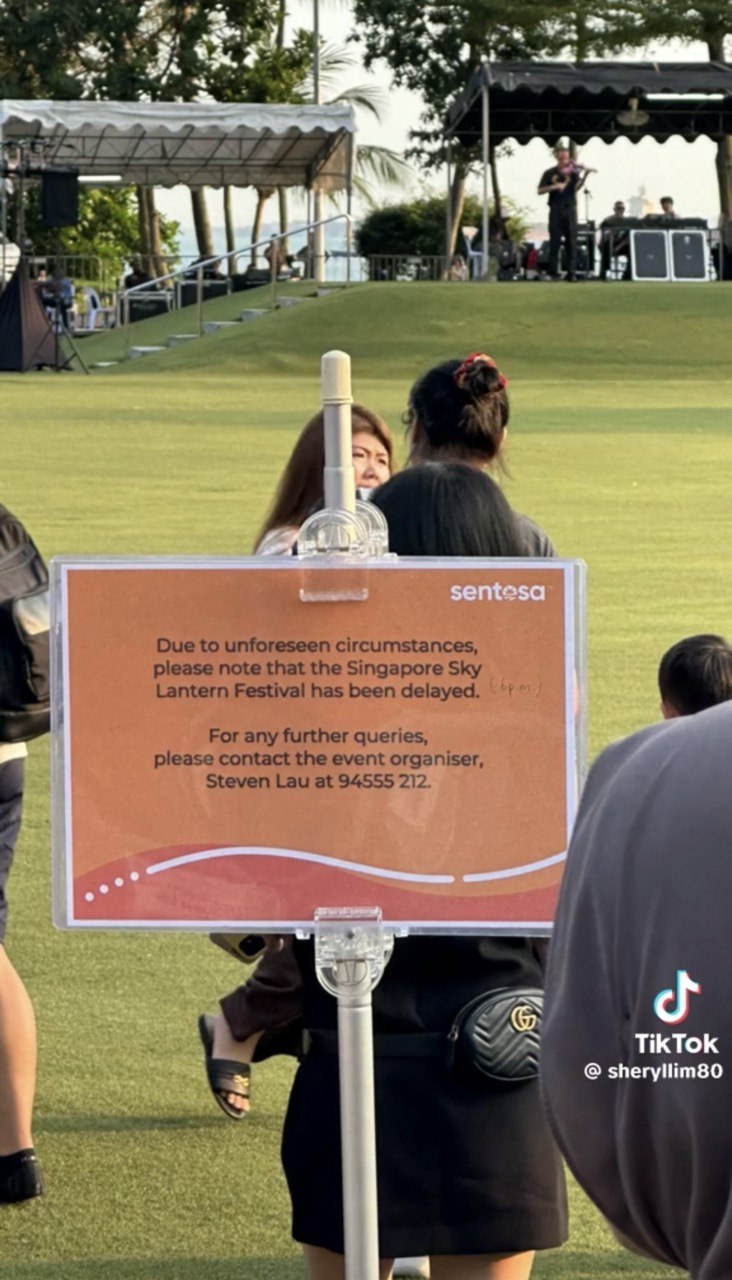Still remember the Sky Lantern Festival sage earlier this year? Well, there’s a new update to the saga — those who lodged complaints about the festival with the Consumers Association of Singapore (CASE) will be refunded.
And here’s the kicker — the refunds total up to approximately $20,450. Not so heng, ong, huat for the event organisers.
A Recap of the Sky Lantern Festival Saga
In case you’ve already forgotten what the Sky Lantern Festival saga was about, fret not, we’ll recap it for you.
The Sky Lantern Festival, scheduled for 21 February 2024 in Palawan Green, Sentosa, was meant to bring Taiwan’s iconic lantern releases to Singapore. Those who bought tickets for the event anticipated the chance to write their wishes on lanterns before “releasing” them into the sky.
Yet, event-goers who paid $50 for each ticket found the festival to be a massive letdown.
The lantern release segment of the Sky Lantern Festival was cancelled as the festival failed to adhere to the safety guidelines set out by the Singapore Civil Defence Force (SCDF). For instance, the SCDF found that the organiser did not provide fire extinguishers at the venue.

Contrary to what eventgoers anticipated, many were asked by the event organisers, Asian Couture and Boutique, to use LED lanterns instead.
In essence, the botched Sky Lantern Festival was the epitome of the “expectations vs reality” joke.

As a result, eventgoers flocked online to air their complaints about the festival, with many more lodging complaints about the event with CASE in true Singaporean fashion.
You can find out more about the Sky Lantern Festival saga here:
Nearly $20,450 Worth of Refunds for Disgruntled Sky Lantern Festival Attendees Who Lodged Complaints to CASE
On Monday (1 Aug), CASE shared that it saw a 538% spike in complaints about the entertainment industry in the first half of 2024 — while the first half of 2023 only saw 105 complaints about the entertainment industry, the first half of 2024 saw a total of 670 complaints.
I don’t think this is what people mean when they ask you to aim high…
Following the CASE complaints and extensive discussions between CASE and the event organisers, the saga seems to have finally concluded with a happy ending for eventgoers who were initially denied ticket refunds — eventgoers who lodged a complaint with CASE managed to secure a refund for their Sky Lantern Festival tickets, worth $50 each.
According to CASE’s statement, the refunds totalled about $20,450. This means that approximately 400 eventgoers managed to secure full refunds for their Sky Lantern Festival tickets.
CASE President, Mr Melvin Yong, shared: “Unfair trade practices in the events and concerts sectors have the potential to impact many consumers as we saw this happen during the botched Sky Lantern event in February this year.”
Well, we can only hope that the fiasco that was the Sky Lantern Festival does not repeat itself. However, even if it does, Singaporeans can rest assured knowing that consumer protection organisations like CASE would not hesitate to take action.
Surge in Number of CASE Complaints About E-Commerce
In other news, aside from the 538% increase in CASE complaints about the entertainment industry, e-commerce also saw a 53% increase in complaints in the first half of 2024.
No prizes for guessing what these e-commerce complaints involved — nearly 21% of online transaction complaints involved the entertainment industry, such as complaints about events and concert tickets.
We’re all too familiar with the ticket scalpers on Carousell and Telegram lah.
And while more Singaporeans have been flocking to tingkat delivery companies for a convenient solution to our meals, not everyone has been having the best time with tingkat deliveries — according to CASE, there was also a rise in complaints about these companies.
If you’re one of the unlucky ones who ran into issues dealing with e-businesses, we have a tip for you.
In the future, look out for the CaseTrust accreditation, issued by CASE for e-businesses, when you shop online. Currently, while only seven businesses have been accredited with the eCaseTrust mark, CASE aims to onboard another eight companies by the end of the year.
Here’s what the CaseTrust accreditation looks like:

Happy shopping!
312% Increase in Prepayment-Related Losses
Last, CASE also shared that in the first half of 2024, there was a 312% increase in prepayment-related losses.
Prepayment losses are quite literally what they sound like — losses a consumer incurs from paying large amounts of sums upfront. These losses are incurred, for instance, when a business suddenly closes down.
Consumers in the first half of 2024 reported nearly $1,246,500 worth of prepayment losses, compared to $302,205 in the first half of 2023.
It’s tough being a consumer nowadays lah.
The industry that recorded the highest amount in prepayment losses might not be an industry that comes to mind immediately, but it’s an industry that doesn’t surprise anyone — the bridal industry.
Yes, you read that right. With the Singaporean dream of BTOs, also comes the not-so-dreamy process of getting things in order for marriages.
And some couples have had it worse than others thanks to prepayment losses incurred for wedding planning.
The bridal industry recorded nearly $267,500 worth of prepayment losses, primarily due to the sudden closure of the bridal studio, Love Nest, and its associated bridal salons.

So, if you’re looking to get married soon, try to choose a reliable bridal studio lah, hor?
The food and beverages industry also saw about $47,500 in prepayment losses, mostly due to Sakura Buffet Pte Ltd’s sudden closure after the Singapore Food Agency (SFA) cancelled its license due to food safety concerns.
But not to worry — it appears that CASE will be working to expand prepayment protection features to better protect consumers from such incidents.
Mr Yong also added: “The government should also legislate prepayment protection for high-risk businesses that collect large amounts upfront.”




